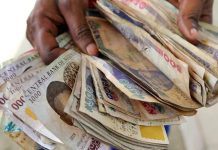Due to allegations that the Nigerian naira is significantly undervalued, the value of the local currency has increased in foreign exchange markets. In the last week, there was a decline in exchange rates at both official and alternative markets due to heightened demand for the US dollar.
The possibility that the naira will regain the losses it has sustained since the significant devaluation in June 2023 has increased because better foreign exchange inflows haven’t been able to turn around the local currency’s situation. In an effort to draw more foreign capital into the market, Nigeria is now offering higher rates to foreign investors.
The depreciation of the naira has put strain on the balance sheets of local enterprises. Large foreign exchange liability companies are living beyond their means, and the adverse effects of foreign exchange losses have eroded the capital of Nigeria’s smaller banks.
The outlook is positive for Goldman Sachs, a global investment firm which just predict that the local currency will appreciate N1200 in 12 months. A more Naira Bulls prediction came from the Financial Derivative Company, FDC, claiming that the real value of the local currency should be N910.
At the just concluded policy committee meeting of the Central Bank of Nigeria, CBN, Yemi Cardoso, apex bank governor affirmatively said the naira is grossly undervalued. Data from the FMDQ platform revealed that the naira weakened against the US dollar, depreciating by 1.57% to close at N1,627.40 per US dollar in the official market on Friday’s close.
The parallel market also witnessed a 0.44% weakening, closing at N1,600 per dollar on Friday due to increased demand ahead of CBN’s implementation of US dollar sales to the Bureau De Change.
In the global commodity market, oil prices decreased, as Brent crude fell by 0.27% to $82 per barrel, while West Texas Intermediate (WTI) crude also dropped by 0.51% to $78 per barrel.
The market faced demand pressures as OPEC+ members extended their voluntary production cuts of 2.2mbpd into Q2:2024 to support the oil market amid concerns over demand and rising oil output from non-members.
The expected positive impact on price from the cut coupled with positive trade data from China and an uptick in India’s oil demand, was offset by scepticism around the supply cut and increase in US crude inventories.
Consequently, Brent crude oil dipped 1.8% week on week to $82.08 per barrel on Friday. Nigeria’s FX reserves grew further this week, as the gross reserves level increased by $347.53 million week on week to $34.11 billion, data from the CBN showed.
The increase in foreign reserves balance was driven by foreign capital inflows following CBN’s drive to attract FX. Analysts said Nigeria has seen foreign net inflows of $822.6 million through the NAFEM window year to date.
In a note, Afrinvest Limited said at the NAFEM Window, the activity level improved 41.4% or $473.1 million to $1.6 billion and the price currency fell 4.9% against the US dollar to ₦1627.40/$1.00.
“We note that the spread between the NAFEM and parallel rates sustained its streak for the second week though weekly average declined 98.8% to ₦27.40”, Afrinvest stated.
Notwithstanding the recent policy actions by the CBN, the currency has remained under pressure, given that the market supply remains frail.
“However, we are encouraged by the pace of market reforms and the apex bank’s renewed interventions – the CBN further reduced the FX backlog after providing a further $200.00 million during the prior week which reduces the backlog to about $1.60 billion.
“In our view, as the CBN forges forward with its initiatives – which have included ensuring the naira assets are attractive to foreign participants to drive capital importation, and domestic participants (to drive investments over speculation – and clears the FX backlog) that dynamics in the FX market may improve and consequently lead to improved liquidity over the medium term”, Cordros Capital said in note.











